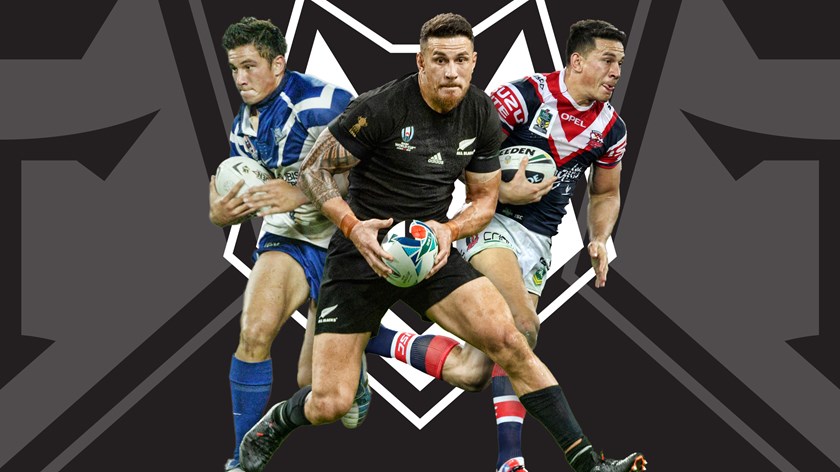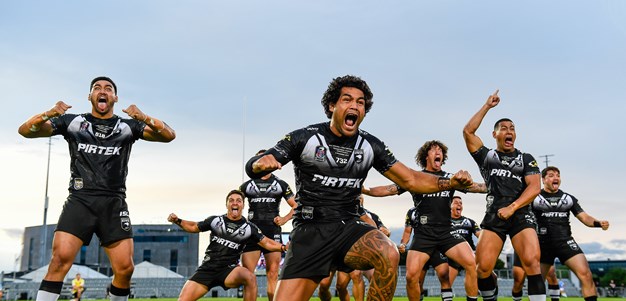The 2020 Oceania Cup is set to include a final to determine the winner and there are also plans to introduce a women’s tournament.
The absence of a final at the end of pool games and the ad-hoc nature of women’s internationals for Pacific nations, including Australia and New Zealand, were two criticisms of the inaugural Oceania Cup.
However, the Asia Pacific Rugby League Confederation and tournament promoters, Duco Events, appear to have taken note of the concerns raised as it is understood the 2020 Oceania Cup will feature a final for teams in the top tier, Pool A, and another for the second tier, Pool B.
There are also likely to be women’s internationals run concurrently with 2020 Oceania Cup Tests, which will be played on June 20 during the NRL’s standalone representative weekend, and at the end of the season.
An inaugural women’s Oceania Cup involving up to six nations is proposed for 2022 after the tournament takes a break in 2021 while the World Cup is being played in England.
The Oceania Cup was created on the back of the success of the Pacific nations at the 2017 World in a bid to provide teams with more meaningful Tests.
It looks like you may be using adblocking software to view this site.
Many features on the site, such as video playback, may not work properly when using adblocking software.
Please whitelist our domain or disable your adblocker to access all features and videos.
Match Highlights: Papua New Guinea v Great Britain
Results suggest the concept was a success, with Tonga beating Australia and Great Britain, Papua New Guinea also upsetting the Lions and the Test between Fiji and the Kumuls being arguably the best of the tournament.
However, governance in some Pacific nations has not matched the rise in on-field performances of their teams, with the political turmoil in Tonga costing organisers of the Oceania Cup and Great Britain Rugby League Lions tour financially. There are also concerns about Samoa.
From 2020, the Oceania Cup – including the mid-season Pacific Test established by the NRL in 2013 – is due to come under the control of the Asia-Pacific Rugby League Confederation.
Scheduling
With Australia embarking on a Kangaroo tour to Britain at the end of next season, the 2020 Oceania Cup will feature New Zealand, Tonga and Fiji in the top tier after the Bati won Pool B of this year’s tournament.
Samoa and Papua New Guinea will be joined in Pool B by the Cook Islands, who last weekend secured the 16th and final berth at the 2021 World Cup by beating USA in Florida.
The top two teams in each pool are set to play a final, which will be staged as a double-header, in a bid to avoid the situation in which Tonga beat Australia at Eden Park but Kangaroos captain Boyd Cordner received the Oceania Cup Trophy on for-and-against.
If Australia were again involved in the Oceania Cup next season and promotion and relegation impacted on Pool A, Tonga would be playing in Pool B as they finished last on for-and-against.
It looks like you may be using adblocking software to view this site.
Many features on the site, such as video playback, may not work properly when using adblocking software.
Please whitelist our domain or disable your adblocker to access all features and videos.
The must-see plays from a historic night in Port Moresby
Australia and New Zealand will also play an end-of-season Test in 2020 before the Kangaroos head to Europe for a three-Test series with England and a possible Test against France and potentially midweek games against Super League clubs.
In addition to the Oceania Cup, the Kiwis are also considering 2020 Tests against Samoa and Papua New Guinea – the latter to be played in Port Moresby.
With no Oceania Cup in 2021, there is the possibility of an Oceania Cup Festival at the end of the season, which could double as World Cup warm-up matches for Pacific nations.
It is unclear what will happen after the World Cup when the Kangaroos return to the Oceania Cup as there would be too many nations for two pools of three teams – a scenario that may prompt consideration for eventually expanding the tournament.
It looks like you may be using adblocking software to view this site.
Many features on the site, such as video playback, may not work properly when using adblocking software.
Please whitelist our domain or disable your adblocker to access all features and videos.
Match Highlights: PNG Orchids v England
Women's Oceania Cup
Regardless, the tournament is set to expand in 2022 with the introduction of a Women’s Oceania Cup, featuring the likes of Australia, New Zealand, Papua New Guinea, Cook Islands and Fiji.
Women’s rugby league is growing at a rapid rate and 17 countries have applied to play in an Emerging Nations World Cup tournament in Manchester in 2021, with Fiji, Samoa, Tonga and Vanuatu believed to be among them.
Australia, New Zealand, Cook Islands and PNG Orchids, who recorded an historic Test defeat of England in Port Moresby last weekend, will contest the 2021 World Cup, along with England, France, Canada and Brazil.
The Jillaroos and Kiwi Ferns played before last month’s Australia-New Zealand Oceania Cup Test in Wollongong, while the Kiwi Ferns hosted Fetu Samoa as a curtain-raiser to the mid-year NZ-Tonga Test and the Orchids played Fiji at Leichhardt Oval.
The establishment of an Oceania Cup would be another step forward for the game following the announcement by RLWC2021 organisers that all players – male, female and wheelchair – would receive equal payment.
Prize-money has also been introduced for the women’s and wheelchair World Cups for the first time, while the schedule for the women’s tournament was altered to increase turnaround times between matches for the eight teams.
Players in the four women’s teams at last month’s World Cup 9s at Bankwest Stadium also received the same payment from tournament organisers as their male counterparts.
Governance and SBW
While the standard on the field continues to rise, governance issues remain and the political wrangling in Tonga is believed to have cost the game $100,000 in legal fees after the suspended Tonga National Rugby League took court action to stop the team playing as Mate Ma’a Tonga.
Calls for fans to boycott the hastily organised Tonga Invitational XIII, which was formed to ensure the financial viability of the Oceania Cup and Lions tour, also affected attendances in Hamilton and Eden Park.
Without the “sea of red”, both matches would have been financial disasters as the return of the Great Britain concept failed to attract travelling fans and Samoa’s supporter base in New Zealand didn’t turn out for the Eden Park triple-header.
More people of Samoan heritage live in Auckland than those of Tongan heritage and their 2017 World Cup matches against New Zealand and Tonga both drew 18,000 crowds.

Samoa’s performance against Fiji was undoubtedly the biggest disappointment of the Oceania Cup and has raised questions about the future direction of the team from former players and the local media.
NRL.com revealed that Sonny Bill Williams may consider representing his Samoan heritage after returning to league with Toronto Wolfpack.
Golden Boot winner Roger Tuivasa-Sheck was born in Apia but plays for New Zealand alongside Ken Maumalo, while Nelson Asofa-Solomona Josh Papalii and Payne Haas are others who are eligible for Samoa.









